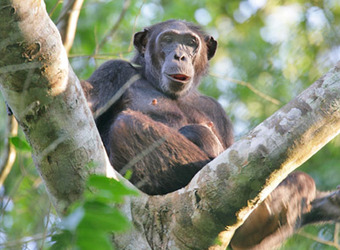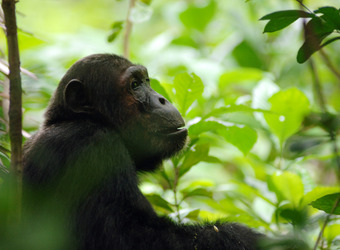Mahale Mountains
Click here to be the first to review Mahale Mountains
Start Planning Your Custom Safari view larger image
view larger image
Deep in the African interior, accessible only by boat, lies a range of jungle-cloaked peaks overlooking Lake Tanganyika. These mountains shelter about 800 of Africa’s last remaining wild chimpanzees. Some have been habituated to human contact, providing one of Africa’s most magical wildlife adventures — tracking and watching chimps in their natural habitat. The rainforest is also home to easily observed troops of monkeys and a kaleidoscopic array of birds.
 view image gallery
view image gallery
The Safari Experience
This rugged and hilly landscape in the western reaches of Tanzania is a wild place with no roads; the only access is via an isolated beach straddling the forested mountains and vast lake. Chimpanzee treks take place in the mornings, going high into the mountains in the rainy season and staying lower during the dry season, dependent completely on the chimp movement. Enjoy afternoon down time with a swim in or kayak excursion on Lake Tanganyika, the second largest freshwater lake in the world by volume. Or hike the forest paths in search of birds and butterflies and take a dip in a brisk freshwater mountain pool beneath natural waterfalls. Cap off the day with an evening boat cruise in a traditional wooden dhow or relaxing over a sundowner cocktails on the sand. During the rainy season, photograph dramatic thunderstorms over the lake.
 view image gallery
view image gallery
Wildlife
The focus at Mahale is chimpanzees. Morning treks follow their hooting calls, and once a troop is located, visitors may spend an hour with them, often sitting on the forest floor while watching adults interact as the youngsters tumble about and play games evocative of those human children play. The chimps live on the lower slopes from August to December, meaning that it takes less time to track them down, sometimes getting very close to their camp. Around January they disperse in search of food and remain on the higher slopes through June and July, eating abundant fruits. Japanese primate researchers have studied chimpanzees here for more than 50 years, and the animals have been on view to visitors since the park was gazetted in 1985. A total of nine primate species lives here, while other mammals include bushbuck and bush pig. A variety of colorful birds and butterflies are also on display.
 view image gallery
view image gallery
How to Include Mahale Mountains in Your Safari Itinerary
Recommended Number of Nights
Nature Travelers: 4 nights with 3 nights at Katavi
Photographers: 4 nights with 3 nights at Katavi
Families: 3-4 nights combined with Katavi
Active Travelers: 3 nights combined with Katavi or Selous
Other Regions to Include
Mahale’s remote location makes it a perfect combination with nearby Katavi National Park. Twice weekly flights operate from Arusha into both areas. Katavi’s wildlife drives over vast plains filled with enormous elephant and buffalo herds and plentiful predators are a vivid complement to viewing chimps on foot in Mahale’s lush setting of forest and lakes. Ruaha National Park connects easily to Mahale and showcases excellent elephant, wild dog, predator and bird sightings in a remote and unpopulated setting. Selous Game Reserve further enhances the wildlife experience with walking safaris and boating on the Rufiji River. The Swahili coastal town of Zanzibar is a perfect extension, and for primate enthusiasts, Zanzibar is home to the endangered red colobus monkey and other small mammals.
